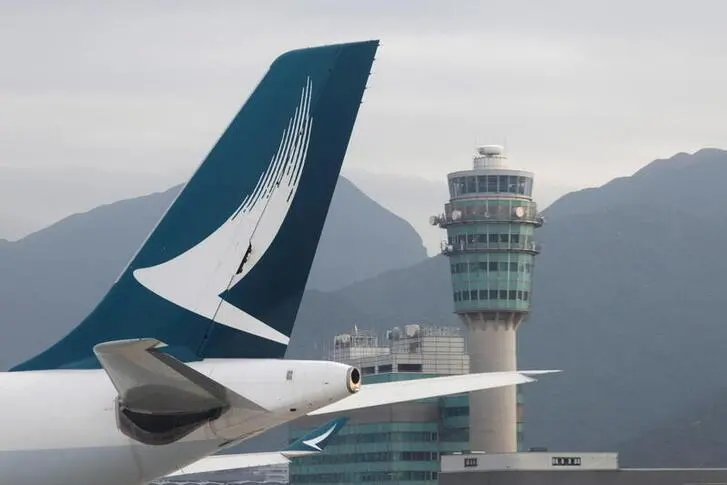PHOTO
Hong Kong's Cathay Pacific Airways said on Monday it was inspecting all 48 of its Airbus A350 widebody jets after the in-flight failure of a component in an engine that is made by British manufacturer Rolls-Royce.
WHAT HAPPENED ON THE FLIGHT?
A problem unfolded several minutes after take-off on flight CX383 from Hong Kong to Zurich on Monday, according to flight tracking service FlightRadar24.
The five-year-old A350-1000 plane performed two wide circles and dumped fuel over the sea before returning to Hong Kong where it landed safely about 75 minutes after its departure.
Cathay Pacific said it identified an engine component failure after the aircraft returned to Hong Kong.
WHY DID THE A350 ENGINE FAIL?
Cathay Pacific has not specified which engine component failed, but the carrier said it was the "first of its type to suffer such failure on any A350 aircraft worldwide".
A person familiar with the matter told Reuters the incident involved a problem with a fuel nozzle inside a XWB-97 engine, the Rolls-Royce model used on the A350-1000.
HOW MANY TYPES OF A350S ARE THERE?
The Airbus A350 is a twin-aisle long-haul aircraft that can carry between 300 and 480 passengers. It comes in two sizes: the A350-900 and the larger A350-1000, both powered exclusively by Rolls-Royce engines.
WHAT ENGINE DOES THE A350 USE?
The A350-1000 and the A350 freighter use Trent XWB-97 engines, Rolls-Royce's largest civil jet engine.
The more popular A350-900 uses its Trent XWB-84 engines.
ARE ALL A350 ENGINES AFFECTED?
It is not clear.
Cathay Pacific said the incident occurred on one of its 18 A350-1000 planes, but it was also inspecting its 30 A350-900s as a "precautionary measure".
The airline said it had "identified a number of the same engine components that need to be replaced" but did not say on which model aircraft.
Rolls-Royce did not immediately respond to a request for comment on the reported fuel nozzle problem, but said earlier it was aware of the incident at Cathay and would work closely with the airline, Airbus and relevant authorities.
Rolls-Royce shares closed 6.5% lower on Monday.
HOW MANY A350 AIRCRAFT COULD BE IMPACTED?
There are 88 A350-1000 jets in operation worldwide, according to Swiss aviation intelligence provider ch-aviation.
The top six operators are Qatar Airways with 24 planes, British Airways with 18, Cathay Pacific with 18, Virgin Atlantic with 12 and Etihad Airways and Japan Airlines (JAL) with five each.
There are 520 A350-900s in operation worldwide, ch-aviation data shows.
It is not clear whether other airlines are inspecting their engines.
Broker Jefferies said in a note to clients on Monday that 234 XWB-97 engines had been delivered to customers by the end of June.
WHICH CATHAY PACIFIC FLIGHTS HAVE BEEN CANCELLED?
Cathay Pacific said on Monday it had cancelled 24 return flights between Hong Kong and Sydney, Osaka, Tokyo, Taipei, Bangkok and Singapore operating until the end of Wednesday, and it would update on further cancellations as it completes its inspections.
The airline's A350s also serve destinations in Europe and North America.
Cathay Pacific shares were down 0.5% in morning trade on Tuesday.
WHAT ARE OTHER AIRLINES WITH A350S DOING?
Tokyo-based JAL, which has five A350-1000s that are all less than a year old, said it has asked Rolls-Royce for more information and had not stopped A350 flights in the meantime. "If the engine manufacturer takes any further action, we will respond accordingly," a JAL spokesperson said.
Taiwan's China Airlines, which operates 15 A350-900s but no A350-1000s, said its fleet did not use the affected engines, so its operations would not be impacted.
"The company will continue to pay attention to the instructions of the original manufacturer and take the initiative to arrange for testing operations to ensure the safety of aircraft operations," it said in a statement.
(Reporting by Lisa Barrington in Seoul; Additional reporting by Maki Shiraki in Tokyo and Ben Blanchard in Taipei; Editing by Jamie Freed)





















